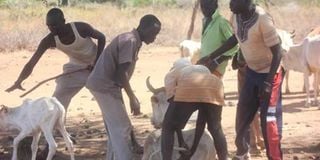Govt to buy 100,000 animals from areas hit by drought in Baringo

Residents of Barwessa in Baringo North lift a cow emaciated by the biting drought. The national government has launched the programme to purchase emaciated livestock from farmers in parts of Baringo County. PHOTO | CHEBOITE KIGEN | NATION MEDIA GROUP
What you need to know:
- Project is aimed at insulating farmers against possible losses due to scarcity of water and pasture.
- The project has begun in 23 arid and semi-arid counties including Samburu County.
- of Segor said animals which will be bought will be taken to Nairobi for slaughter.
The national government has launched the programme to purchase emaciated livestock from farmers in parts of Baringo County.
Speaking in Kabarnet Town on Monday, Water Principal Secretary Fred Segor said the initiative targets to purchase about 100,000 animals from areas worst hit by drought especially in Tiaty and Baringo North sub-counties.
Prof Segor said the project is aimed at insulating farmers against possible losses due to scarcity of water and pasture and allow them to re-stock after the long-rains season starts.
"The programme will target drought-stricken areas such as Saimo Soi, Tiaty, Barwessa, Baringo South, and Mogotio,” said the PS.
He said that government has allocated funds to the Kenya Meat Commission to enable the livestock keepers sell their cattle to protect them from the ravaging drought.
SEMI-ARID COUNTIES
The project has begun in 23 arid and semi-arid counties including Samburu County.
In late November 2016, the National Assembly Chairman of Agriculture and Livestock Adan Mohammed Noor disclosed that Sh600 million had been set aside to buy livestock from pastoral communities due to the famine being experienced across the country.
Mr Noor, who is also the Mandera North MP urged livestock keepers to take advantage of the initiative and sell their livestock to KMC.
On Monday, Prof Segor said animals which will be bought will be taken to Nairobi for slaughter.
“This programme will mainly target areas of West Pokot and Baringo counties.
“This is because the areas have experienced devastating drought situation,” he said.





